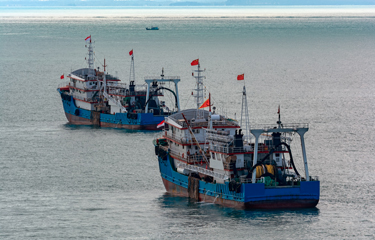New EU fisheries rules likely to limit market access for Chinese fleet

The European Union has taken steps that would tighten Chinese seafood’s access to the European market by approving new fisheries control rules that aim to prevent seafood caught by illegal, unregulated, and unreported (IUU) fishing activities from entering its ports.
Campaigners have long advocated for more transparency on distant-water fishing, including calls for public access to information on the ownership of fishing vessels and improvements to the E.U.’s current system for identifying vessels engaged in IUU fishing or those carrying out human rights violations.
E.U. Parliament Fisheries Committee Chair Pierre Karleskind appeared to agree with calls from campaigners, and said that among many other goals, the new rules aim to strengthen the traceability of imported products “in order to guarantee compliance with the social and environmental standards to which European fishers are subject to.”
That has become a sticking point in the newly approved rules, and NGOs have welcomed the E.U. Parliament’s recent actions to curb IUU activities.
Steve Trent, CEO of the Environmental Justice Foundation (EJF), said IUU and labor abuse in the global fleet makes it “key that the E.U. steps up its ability to act” to protect legitimate European operators. He pointed to the size of China’s fleet when highlighting how its behavior “threatens socioeconomic stability and inflicts human and ecological harm globally” and why it’s so important that the new rules include such preventative actions.
Trent claims that the EJF exposed 554 suspected IUU-linked human rights abuses involving the Chinese distant-water fleet across global oceans in just three years – from 2019 to 2022 – and singled out forced labor as a global problem “which can directly undercut legal operators in the E.U.”
Daniel Voces, CEO of fishing industry lobby Europêche, echoed Trent and has lobbied for ...
Photo courtesy of Igor Grochev/Shutterstock




Share